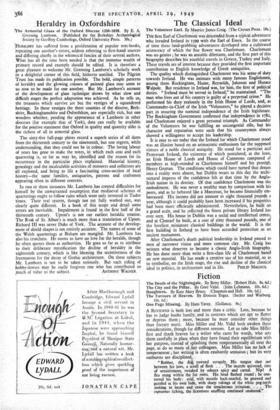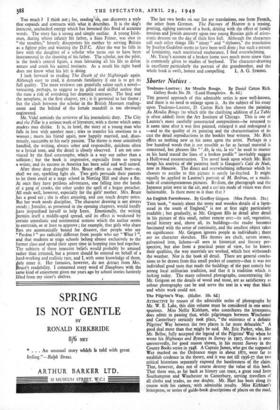Fiction
10s. 6d.)
One Page Missing. By Hans Yaray. (Gollancz. 9s.)
A REVIEWER is both less and more than a critic. Less; because he has to judge books hastily, and in contexts which are apt to flatter or depress them ; more, because he must consider other things than literary merit. Miss Miller and Mr. Vidal both awaken these considerations, though for different reasons. Let us take Miss Miller first and thank heaven for a writer who cares for words, who sets them carefully in place when they have found their equilibrium with her purpose, instead of splashing them temperamentally all over the page, as do so many of. her colleagues. Miss Miller has no lack of temperament ; her writing is often exultantly sensuous ; but its very outbursts are discipline& " Robber, the dot, yawned savagely. His tongue shot out between his jaws, a scroll of flesh. . . . The muzzle quivered, core of sensitiveness, tweaked by odours spicy and carnal. Nip! A flea stung within the fur roots. His head flashed round ; he -con- torted his body : avid, with muzzle back-snarled, he -gnawed and guzzled at his own hide, with sharp rakings of the white peg-teeth seeking to locate and erase the treacherous irritation . . , The rapturous licking, the licentious snuffling continued unabated."
Too much ? I think not ; for, readinan, one discovers a style that expands and contracts with what it describes. It is the dog's innocent, unchecked energy which has loosened this flood of accurate words. The story has h strong and simple outline. A young Irish- man, during whose infancy Ms father, a Sinn Feiner, was shot in " the troubles," bitterly disappoints his mother by serving Britain as a fighter pilot and winning the D.F.C. After the war he falls in love with .the daughter of a scholar who turns out to have been instrumental in the shooting of his father. The scholar, not the pilot, is the book's central figure, a man labouring all his life to defeat nature and crush his animal instincts. As a result his right hand does not know what his left is doing.
I look forward to reading The Death of the Nightingale again. Although easy to read, it demands familiarity if one is to get its full quality. The mere reviewer can gratefully salute such a novel— venturing, perhaps, to suggest to its gifted and skilful author that she runs a risk of overdoing her dramatic contrasts. The bird and the aeroplane, in the first chapter, yes ' - it it germinal to her theme ; but the clash between the scholar in the British Museum reading- room and the behind of the female mandrill is too obviously engineered.
Mr. Vidal reminds the reviewer of his journalistic duty. The City and the Pillar is a serious work of literature, with a theme which some readers may dislike. It is, in brief, the story of a• young man- who falls in love with another man ; tries to transfer his emotions to a woman ; meets his friend again, now happily married, and, disas- trously, succumbs to his early passion: The theme is most sensitively handled, the writing, always sober and responsible, quickens often to a lyrical tone, and the detail is closely observed. I am not con- vinced by the final catastrophe, which is a way out rather than a solthion ; but the book is impressive, especially from so young a writer, and its success in America has been solid and well earned.
After these deep draughts Mrs. Bruce offers us small beer—or, shall we say, sparkling light ale. Two girls persuade their parents to let them enrol at a stage school in Notting Hill and share a flat. At once they have perilous adventures, one falling into the hands of a gang of crooks, the other under the spell of a bogus preacher. All ends well, however, especially for the girls' mother. Mrs. Bruce has a good ear ; she is often amusing, and can touch deeper notes. But her work needs discipline. The character drawing is not always steady ; Jennifer, as presented in the opening chapters, would hardly have jeopardised herself to help Ireen. Emotionally, the writing . permits itself a middle-aged spread, and its effect is weakened by
rcertain unrealistic and sentimental notions which the author seems ,to entertain, or at least to approve ; for example, that girls who share 'fiats are automatically bound for disaster, that people who say "' Pardon ? " are radically different froth people who say " What ? And that students at stage schools belong almost exclusively to the former class and spend their spare time in hopping into bed together. The subjects of these innocent beliefs would probably be amused 'rather than irritated, but a protest should be entered on behalf of a hard-working and realistic race, and I, with some knowledge of them, tuly enter it. Her fantasies, however, do not detract from Mrs. ruce's readability. I consumed every word of Daughters with the same kind of enjoyment given me years ago by school stories furtively lifted from my sister's shelves. The last two books on our list are translations, one from French,. the other from German. The Favours of Heaven is a teasing, pouting, sighing tantrum of a book, dealing with the effect of family tensions and Jewish ancestry upon two young Russian girls of aristo- cratic descent on the day; Of their first ball. Although the characters call each other things like "ninny " and " slyhoots," the translation by Jocelyn Godefroi seems to have been well done ' - but such a torrent of femininity, such uncOrseted exuberance, I find overwhelming.
Mr. Yaray's account of a broken home uses much more sinew than is commonly given to studies of boyhood. The character-drawing is excellent; particularly the portrait of the grandmother, and the
whole book is swift, honest and compelling. L. A. G. STRONG.



































 Previous page
Previous page